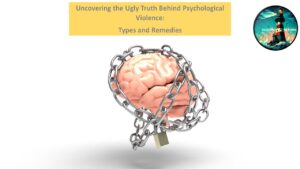
anything useful, in the easiest way

anything useful, in the easiest way
Uncovering the Ugly Truth Behind Psychological Violence: Types and Remedies
Violence is a pervasive problem around the world, affecting people of all ages, genders, and backgrounds. While physical violence often gets the most attention, psychological violence can be just as harmful, if not more so. In this article, we will explore what psychological violence is, the different types of psychological violence, and what can be done to address and prevent it.

What is Psychological Violence?
Psychological violence, also known as emotional abuse, is a form of abuse that is designed to undermine a person’s self-esteem, sense of self-worth, and emotional well-being. It is often characterized by a pattern of behavior that is intended to control, manipulate, or intimidate another person. This can take many forms, including verbal abuse, threats, isolation, intimidation, and humiliation.
Psychological violence can occur in a variety of contexts, including romantic relationships, families, workplaces, and schools. It can have long-lasting effects on a person’s mental health, including depression, anxiety, and post-traumatic stress disorder (PTSD).
Types of Psychological Violence
There are many different types of psychological violence, each with its own set of characteristics and effects. Here are some of the most common types:
Verbal Abuse: This is perhaps the most obvious form of psychological violence. It involves the use of words or language to control, manipulate, or intimidate another person. This can take many forms, including insults, name-calling, yelling, and belittling.
Threats: Threats are another common form of psychological violence. They involve the use of fear to control or manipulate another person. Threats can be overt, such as physical violence or harm, or they can be more subtle, such as threats to leave a relationship or end a friendship.
Isolation: Isolation involves cutting a person off from friends, family, or support networks. This can be done in a variety of ways, such as forbidding contact with others, limiting access to resources, or spreading rumors that damage a person’s reputation.
Intimidation: Intimidation involves the use of physical or psychological force to control or manipulate another person. This can take many forms, including physical violence, stalking, or threatening behavior.
Humiliation: Humiliation involves making another person feel ashamed or embarrassed. This can be done in public or private, and can take many forms, such as criticizing a person’s appearance, behavior, or performance.
Psychological violence can have devastating effects on its victims, like depression, anxiety, low self-esteem and many other even worse consequences.
Assistance and Remedies
If you or someone you know is a victim of psychological violence, it is important to seek help. There are many resources available, including hotlines, support groups, and therapy, that can provide assistance and support to those who have experienced psychological violence. It is important to remember that psychological violence is not the victim’s fault and that no one deserves to be treated in such a manner.
Thank you for reading us.
“so useful to know” team